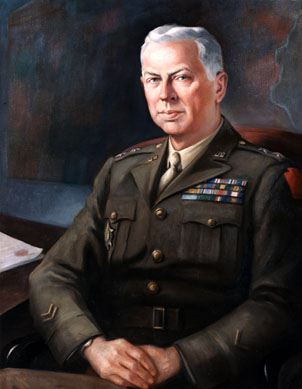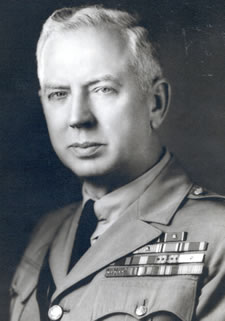Governor Edward Martin
Term
January 19, 1943 - January 2, 1947
Affiliation
Republican
Born
September 18, 1879
Died
March 19, 1967

Photo courtesy of Capitol Preservation
Committee and John Rudy Photography
Biography
Edward Martin ran for office fifteen times and never lost an election. In addition to being governor and U. S. Senator, Martin, six-foot, four inches tall, had a distinguished military career through four wars. Martin was born at Ten Mile, Washington Township, Greene County, on September 18, 1879. He was the son of Joseph Thomas Martin, a local school director, and Hanna M. (Bristor) Martin. Although it can be said that Martin was the last Pennsylvania governor born in a log cabin, his parents were well-to-do farmers and sheepherders who descended from Scots-Irish immigrants in the mid-1600s in New Hampshire on his father's side and from nineteenth century German immigrants on his mother's side. His early education was in a one-room school house called Hazel-Greene, followed by enrollment at Monongahela College in 1895 before transferring to play football and earn his bachelor of arts degree in pre-law from Waynesburg College in 1901. College was interrupted in 1898 to serve in the 10th Pennsylvania Volunteer Infantry during the Spanish-American War and then in the Philippines Insurrection. He returned home in 1899 as a sergeant, and despite having contracted malaria, he completed his degree work. After joining the Pennsylvania National Guard in 1900, he was commissioned as a first lieutenant by the time he graduated. After studying law, Martin was admitted to the Pennsylvania Bar in1905 and began his practice of law in Waynesburg, the same year he was promoted to captain.
On December 1, 1908, Martin married his childhood sweetheart, Mary Charity Scott, and they became the parents of a son, Edward Scott, and a daughter, Mary Charity. He continued to practice law and was promoted to major in the National Guard. In 1912, Martin began his experience in politics when he became a state Republican committeeman. Martin came from a traditionally Democratic family, his first experience in politics was burgess of East Waynesburg from 1902 to 1905; secretary of the county Democratic committee, followed by county chairman, and Greene County solicitor from 1908 to 1910, and, after military service on the Mexican border in 1916, from 1916 to 1920 for the local Democratic administration. By the end of the Great War, Martin switche his party loyalty to the Republicans.
Martin earned four wartime decorations, including the Distinguished Service Cross and Purple Heart, each with an Oak Leaf Cluster, in World War I. The Oak Leaf Cluster is awarded when a medal is awarded more than once. He served with the 109th and 110th Infantry Regiments in five major campaigns in France from July 15, 1917, to April 25, 1919, and was promoted to lieutenant colonel. Martin was one of the few soldiers to narrowly escape a direct shell hit on his headquarters. He also survived a near miss by friendly forces and was gassed by German forces. It took Martin two years to recover from the effects of the mustard gas.
After the war Martin returned to his private law practice and began to invest in the businesses of banking, oil, and gas. He continued to serve in the National Guard and was promoted to colonel in 1919 and brigadier general in 1922. In 1924, Martin was elected auditor general of Pennsylvania, followed by state treasurer in 1928. He amassed a fortune from private investments, and although the Department of Tresury did not lose any money, he lost his wealth in the Great Depression. Using his life savings and inheritance to pay off his debts, he started over. His influence in state politics increased greatly when he was elected state Republican chairman, serving three terms, and was a delegate to national conventions in 1932, 1936, and 1940. Martin received the initial vote of his delegation for vice president in 1932.
In 1936, Martin further enhanced his public image with outstanding work during the Johnstown flood, caused by heavy runoff of melting snow combined with three days of rain. Martin followed in the footsteps of an earlier adjutant general, Daniel Hastings, who became governor after he became a state hero during the 1889 Johnstown flood. While another world war approached in 1939, Martin was promoted to major general in command of Pennsylvania's 28th National Guard Division and became state adjutant general under the administration of Governor Arthur James.
When the Japanese attacked Pearl Harbor on December 7, 1941, General Martin was sixty-two years old. In 1937, he had already earned Pennsylvania's General William Moffat-Reilly Medal for forty years of service to the National Guard, but he was ready to serve the U. S. Army once again in a fourth war. By then, the National Guard was federalized and Martin, in command of the 28th Division, assisted in the war preparation of troops and supply and leading training maneuvers in North Carolina. By April 1, 1942, Army regulations required that Martin be released from active duty due to his age.
Martin was far from being ready to retire, however, and many state Republicans were looking to General Martin to run for governor to succeed Arthur James. A soldier-statesman during wartime appealed to voters who gave Martin the primary victory in fifty-seven of sixty-seven counties. Martin went on to defeat Democrat F. Clair Ross in November by a little more than 217,000 votes.
Martin later regarded guiding Pennsylvania through the height of World War II as the most important role of his administration. In his inaugural speech Martin said, "Right now nothing matters but winning the war, because if we do not win it, nothing else will matter." More than one million Pennsylvanians were in the armed forces during the war and 33,000 sacrificed their lives. The legislature gave the governor the power to suspend or modify any law that impeded the war effort, subject to review by a six-man legislative panel. With this backdrop, Martin was able to turn his attention to other state business.
The previous administration of Arthur James allowed, for the first time since 1931, for the governor to start with a tax surplus, which was $18 million. The war abruptly changed the Depression era struggle as Pennsylvania's industries brought people into the workforce, increasing output two and half times during Martin's administration, with twenty percent of the world's steel coming from the Commonwealth. Increasing production and employment meant more tax revenues and Martin was able to reduce taxes by $44.7 million and employment payroll taxes by $60 million. Not all employment problems were solved, so Martin urged more funds for unemployment compensation and liberalized insurance benefits for occupational diseases. Teacher salaries were also increased by $24.3 million and, in 1945, landmark educational legislation to provide more equitable local taxation and state funding of public schools was put into law.
Martin also recognized the importance of historical preservation and in 1945 upgraded the role of the Pennsylvania Historical and Museum Commission to become an independent agency reporting directly to the governor. He also insisted upon greater enforcement of mine and factory safety inspections. Governor Martin's historical perspective on the principles of William Penn and fighting alongside soldiers of all walks of life led the governor to call for an end to discrimination. For Pennsylvania's soldiers fighting the war, the legislature passed an absentee ballot law for the first time since the Civil War.
Martin remained conservative when it came to government spending. In urging a balanced budget, Martin said, " . . . a government which gives the people everything they want will soon take everything they have." Still, state coffers allowed a veterans' rehabilitation program to be established and money was appropriated for a stream purification program. Martin wanted to return the administration of welfare to the counties through a home-rule proposal, but the legislature did not agree with him. After four years as governor and prohibited by the state constitution to succeed himself for another term, Martin turned his attention to the race for the U.S. Senate. 
Although Democrats controlled the White House with President Harry S. Truman and had controlled both senate seats, Republicans dominated Pennsylvania politics in 1946 when Republican James Duff won the gubernatorial election and Martin easily defeated Democratic incumbent Senator Joseph M. Guffey, who had been in the Senate since 1935, by 608,000 votes. Martin was the first governor since William Bigler in 1854 to be elected to the senate. In order to avoid losing senatorial seniority, Governor Martin resigned his office twenty days early so that he could take his place with the new session of Congress, leaving Lieutenant Governor John Bell Jr. to finish the last three weeks of his term.
Martin was an outspoken anti-Communist and, as a devout Presbyterian. He was a nonsmoker and rarely drank alcohol, leading him to attend few Washington cocktail parties. He was rarely heard verbally attacking opponents, instead sticking to his Americanism speeches. He had a booming, authoritative voice, part of his military bearing that encouraged people to continue to address him as General Martin, a title he preferred even after serving as governor and senator. His main interest in the senate was fiscal matters and believed that the U.S., like Pennsylvania, should have a balanced budget. He warned that the national debt was a threat to the nation's security. During the Korean War, he advocated military training for all eighteen-year-olds.
In 1948 at the national GOP convention in Philadelphia, Martin had support as a presidential nominee by the political machine of Joseph Newton Pew Jr. (1886-1963), founder of the Pew Charitable Trusts. Pew opposed Thomas E. Dewey for president and Philadelphia's favorite son James H. Duff, who would later become governor. Martin instead placed his support behind Dewey, which infuriated some members of the Pennsylvania delegation at the national convention. In the Pennsylvania primary, Martin received more than 45,000 write-in votes for president, the largest in history for a Pennsylvania governor until William Scranton in 1964. Martin was reelected to the U.S. Senate in 1952 and served as chairman of the Committee on Public Works. Martin did not run for reelection in 1958.
Martin finally retired from public life to his home in Washington, Pa. where he concentrated on directing the Dun-Mar Oil and Gas Company as company president and writing his autobiography, Always Be On Time (1959), a title that revealed Martin's attitude about his expectation of punctuality. During his lifetime, Martin was also: director, Washington County Fire Insurance Company; president and director, Chartiers Discount Company; director Citizens National Bank, Washington, Pennsylvania; and author and editor of the History of the 28th Division. He was a member of the Veterans of Foreign Wars, American Legion, Legion of Valor, Sons of the Revolution, Military Order of the Carabao, and Spanish-American War Veterans; elder of the Presbyterian Church; on the board of the Department of Church Cooperation and Union of The Presbyterian Church in the United States; vice president and director of the Pennsylvania State Sabbath School Association; and member of the F. & A.M. (33rd Degree) and the B.P.O.E. Home in Washington (Pa.).
Edward Martin died March 19, 1967, and is buried in Green Mount Cemetery in Waynesburg, Greene County.
Pages in this Section
- 1876-1951
- John Frederick Hartranft
- Henry Martyn Hoyt
- Robert Emory Pattison
- James Addams Beaver
- Daniel Hartman Hastings
- William Alexis Stone
- Samuel Whitaker Pennypacker
- Edwin Sydney Stuart
- John Kinley Tener
- Martin Grove Brumbaugh
- William Cameron Sproul
- Gifford Pinchot
- John Stuchell Fisher
- George Howard Earle
- Arthur Horace James
- Edward Martin
- John Cromwell Bell Jr.
- James Henderson Duff